
Duration
14 Nights
Journey Type
Sailing from Croatia
Ports
13 Ports
21-22 June
Setting sail from Dubrovnik
We never fail to be moved when we see the terracotta roofs and honey-golden walls of Dubrovnik, and a stroll around the perfectly preserved old town is a highlight of any visit to the Dalmatian coast. Formerly known as Ragusa, Dubrovnik is a city with a rich, and occasionally troubled, history; the shelling of the city was one of the most shocking images of the Balkan wars of the 1990s, which makes the painstaking restoration of the old town in the years since all the more remarkable. Make sure you take the time to walk around the walls and soak up the views across the rooftops towards Lokrum island, and the deep sapphire of the Adriatic Sea beyond.


Don't miss
The War Photo museum offers a sobering reminder of the conflicts that convulsed the Balkans in the 1990s. It’s not easy viewing, but it does make you appreciate the extraordinary extent to which Dubrovnik has bounced back.
23-24 June
Croatia: Split
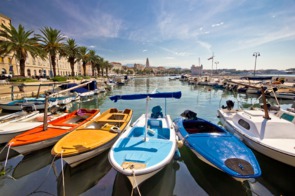
Croatia’s second city enjoys a dramatic setting, hugging a sweeping bay against a backdrop of sheer grey mountains. Split's labyrinthine old town is contained within the remarkable Roman ruins of Diocletian’s Palace, a UNESCO World Heritage Site, and spills out onto the buzzing seafront Riva promenade.
24 June
Croatia: Zadar

Located on the quieter northern stretch of Croatia’s Dalmatian coast, the walled port city of Zadar is an intriguing blend of old and new, where Roman ruins and psychedelic modern art installations sit alongside one another.
25 June
Croatia: Opatija
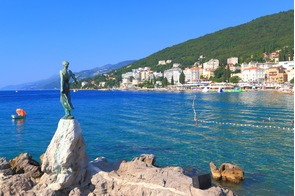
Opatija was the favourite seaside resort of the Austro-Hungarian elite during the 19th century, a legacy that lives on in the town's handsome belle époque villas. Take a stroll along the promenade, enjoy a swim in a protected bay or visit the Volosko neighbourhood, home to some excellent seafood restaurants.
26 June
Slovenia: Piran
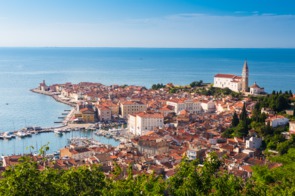
Pretty little Piran grew rich thanks to the salt trade, and thrived under both the Venetian Republic and the Austro-Hungarian empire. The well-preserved old town is the highlight of Slovenia’s short stretch of coastline, set on a small peninsula jutting out into the Adriatic.
27-28 June
Italy: Venice
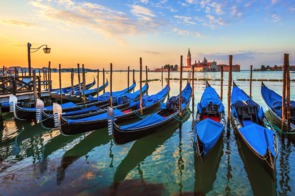
Venice is a city like no other, a marble maze of turquoise canals criss-crossed by beautiful bridges, overflowing with palaces, churches and charming little piazzas. No matter how many times you’ve seen it in photographs, that first glimpse of the Grand Canal will simply take your breath away.
29 June
Croatia: Rovinj

Rovinj is undoubtedly the highlight of the Istrian coast, a picturesque medieval fishing port with a strong Italian influence discernible in everything from the elegant architecture to the bilingual street signs. A day trip to one of the nearby islands also makes for an enjoyable excursion.
30 June
Croatia: Šibenik

One of the Dalmatian coast’s lesser known cities, Šibenik is notable for its compact medieval centre, UNESCO-listed Gothic-Renaissance cathedral and crumbling fortresses. The nearby islands of Zlarin and Prvić also make for an enjoyable day trip.
1 July
Croatia: Trogir

Set on a tiny island off the Dalmatian coast, and connected to the mainland by a bridge, Trogir is small but perfectly formed. The town’s appeal lies in its beautiful UNESCO-listed architecture, the legacy of the Venetians who ruled here for almost 400 years.
2 July
Croatia: Vis

Of all Croatia’s myriad inhabited islands, Vis is the furthest from the mainland, and was off-limits to tourists for many years, reserved for the Yugoslav military. The resulting lack of development is a big part of the island’s appeal, along with stunning scenery, excellent food and wine, and the attractive little towns of Komiza and Vis Town.
3 July
Croatia: Hvar

Hvar is the most popular of Croatia’s islands, a ruggedly beautiful place carpeted with lavender fields and dotted with little villages. The island’s capital, Hvar Town, is a charming collection of marble streets arranged around a harbour, and it gets very busy in the summer months.
4 July
Croatia: Korcula
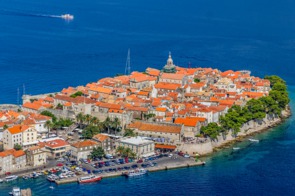
Draped in vineyards and olive groves, the verdant Croatian island of Korcula is famous for its white wine and is said by some to be the birthplace of Marco Polo. The main settlement, Korcula Town, bears more than a passing resemblance to Dubrovnik, with a historic centre encircled by medieval walls and towers.
4-5 July
Arriving in Dubrovnik


Our tip
Walking the entire length of the walls involves a lot of steps, and it can be quite exhausting in the hot Croatian sun. If you’d rather just see a smaller section, the Minčeta tower provides the best photo opportunities.
Your home from home



What we love
Enjoy small ship cruising in style, with comfortable staterooms and suites (most with private balcony), an à la carte restaurant, infinity-style pool, al fresco Sky Bar, wellness area and a marina at the back of the yacht, allowing you to hop straight into the water and have fun with a host of water toys.
| Capacity | 100 Guests |
|---|---|
| Crew | 64 Staff |
| Style |
Intimate and informal, with an emphasis on relaxed, al fresco living and exploration ashore. |
| Inclusions |
|
Tailor-make your trip

Our favourite hotel in Dubrovnik
We love the intimate Villa Orsula, with just eight lovely bedrooms and excellent sea views, but if you want to stay in the Old Town itself, the Pucic Palace is the one to go for.

Day trips from Dubrovnik
Make the short trip across the border into Bosnia-Herzegovina and visit the pretty little town of Mostar, with its famous stone bridge over the river Neretva.









